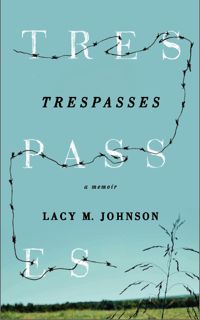
At the start of Trespasses, author Lacy M. Johnson explains her writing process of compiling her memoir by saying that she spent over sixty hours interviewing family members about their life stories. Then, according to Johnson, "At a certain point the facts got in the way of the truth." The line between what is truth and what is fact is always a fuzzy boundary, of course, and it's this fuzzy boundary that Johnson uses as a tool to explore her family's life in rural Missouri.
Johnson's story is not a chronological one. Instead, she chooses to trace the past through episodic scenes; many of them could be described as spots of time or specific transcriptions of memories. Through these snippets we see her parents' and grandparents' stories, stories that often brim with a rugged love of both family and land.
We also see Johnson's own stories . Not only does she record her own memories of growing up, we read quiet contemplations woven in between tales. Identity is the main focus of these contemplations, and indeed, class, race, and gender issues surface through many places in this book. For example, in one section, Johnson considers the meaning of white trash while recording her struggles at a major university. In another section, she discusses her frustration when someone tells her that the rural Midwest doesn't have "culture."
Like Johnson, I know what it is like to struggle with identity. I grew up in rural northern Pennsylvania, a place that cannot be defined by being part of the East Coast (our way of living is nothing like those who live in New York City or Philadelphia), yet we are not really part of the Midwest. Technically speaking, we are part of Northern Appalachia, which yes, is very different than Southern Appalachia -- so as you can see, I find identity a hard subject to examine, and Johnson's episodic exploration of the past is a stark look at the way we navigate our own personal histories.
For more information about Trespasses, and other work by Lacy M. Johnson, visit her website.
Johnson's story is not a chronological one. Instead, she chooses to trace the past through episodic scenes; many of them could be described as spots of time or specific transcriptions of memories. Through these snippets we see her parents' and grandparents' stories, stories that often brim with a rugged love of both family and land.
We also see Johnson's own stories . Not only does she record her own memories of growing up, we read quiet contemplations woven in between tales. Identity is the main focus of these contemplations, and indeed, class, race, and gender issues surface through many places in this book. For example, in one section, Johnson considers the meaning of white trash while recording her struggles at a major university. In another section, she discusses her frustration when someone tells her that the rural Midwest doesn't have "culture."
Like Johnson, I know what it is like to struggle with identity. I grew up in rural northern Pennsylvania, a place that cannot be defined by being part of the East Coast (our way of living is nothing like those who live in New York City or Philadelphia), yet we are not really part of the Midwest. Technically speaking, we are part of Northern Appalachia, which yes, is very different than Southern Appalachia -- so as you can see, I find identity a hard subject to examine, and Johnson's episodic exploration of the past is a stark look at the way we navigate our own personal histories.
For more information about Trespasses, and other work by Lacy M. Johnson, visit her website.
 RSS Feed
RSS Feed
